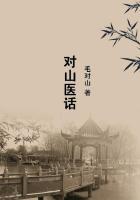Another thing happened in this year, too remarkable for me to neglect to put on record, as it strangely and strikingly marked the rapid revolutions that were going on. In the month of August at the time of the fair, a gang of playactors came, and hired Thomas Thacklan's barn for their enactments. They were the first of that clanjamfrey who had ever been in the parish; and there was a wonderful excitement caused by the rumours concerning them. Their first performance was DOUGLAS TRAGEDY and the GENTLE SHEPHERD: and the general opinion was, that the lad who played Norval in the play, and Patie in the farce, was an English lord's son, who had run away from his parents rather than marry an old cracket lady with a great portion. But, whatever truth there might be in this notion, certain it is, the whole pack was in a state of perfect beggary; and yet, for all that, they not only in their parts, as I was told, laughed most heartily, but made others do the same; for I was constrained to let my daughter go to see them, with some of her acquaintance; and she gave me such an account of what they did, that I thought I would have liked to have gotten a keek at them myself. At the same time, I must own this was a sinful curiosity, and I stifled it to the best of my ability. Among other plays that they did, was one called MACBETH AND THE WITCHES, which the Miss Cayennes had seen performed in London, when they were there in the winter time with their father, for three months, seeing the world, after coming from the boarding-school. But it was no more like the true play of Shakespeare the poet, according to their account, than a duddy betheral, set up to fright the sparrows from the peas, is like a living gentleman. The hungry players, instead of behaving like guests at the royal banquet, were voracious on the needful feast of bread, and the strong ale, that served for wine in decanters. But the greatest sport of all was about a kail-pot, that acted the part of a caldron, and which should havesunk with thunder and lightning into the earth; however, it did quite as well, for it made its exit, as Miss Virginia said, by walking quietly off, being pulled by a string fastened to one of its feet. No scene of the play was so much applauded as this one; and the actor who did the part of King Macbeth made a most polite bow of thankfulness to the audience, for the approbation with which they had received the performance of the pot.
We had likewise, shortly after the "Omnes exeunt" of the players, an exhibition of a different sort in the same barn. This was by two English quakers, and a quaker lady, tanners of Kendal, who had been at Ayr on some leather business, where they preached, but made no proselytes. The travellers were all three in a whisky, drawn by one of the best-ordered horses, as the hostler at the Cross-Keys told me, ever seen. They came to the Inn to their dinner, and meaning to stay all night, sent round, to let it be known that they would hold a meeting in Friend Thacklan's barn; but Thomas denied they were either kith or kin to him: this, however, was their way of speaking.
In the evening, owing to the notice, a great congregation was assembled in the barn, and I myself, along with Mr Archibald Dozendale, went there likewise, to keep the people in awe; for we feared the strangers might be jeered and insulted. The three were seated aloft on a high stage, prepared on purpose, with two mares and scaffold-deals, borrowed from Mr Trowel the mason. They sat long, and silent; but at last the spirit moved the woman, and she rose, and delivered a very sensible exposition of Christianity. I was really surprised to hear such sound doctrine; and Mr Dozendale said, justly, that it was more to the purpose than some that my younger brethren from Edinburgh endeavoured to teach. So, that those who went to laugh at the sincere simplicity of the pious quakers, were rebuked by a very edifying discourse on the moral duties of a Christian's life.
Upon the whole, however, this, to the best of my recollection, was another unsatisfactory year. In this we were, doubtless, brought more into the world; but we had a greater variety of temptation set before us, and there was still jealousy and estrangement in the dispositions of the gentry, and the lower orders, particularly the manufacturers. I cannot say,indeed, that there was any increase of corruption among the rural portion of my people; for their vocation calling them to work apart, in the purity of the free air of heaven, they were kept uncontaminated by that seditious infection which fevered the minds of the sedentary weavers, and working like flatulence in the stomachs of the cotton-spinners, sent up into their heads a vain and diseased fume of infidel philosophy.














